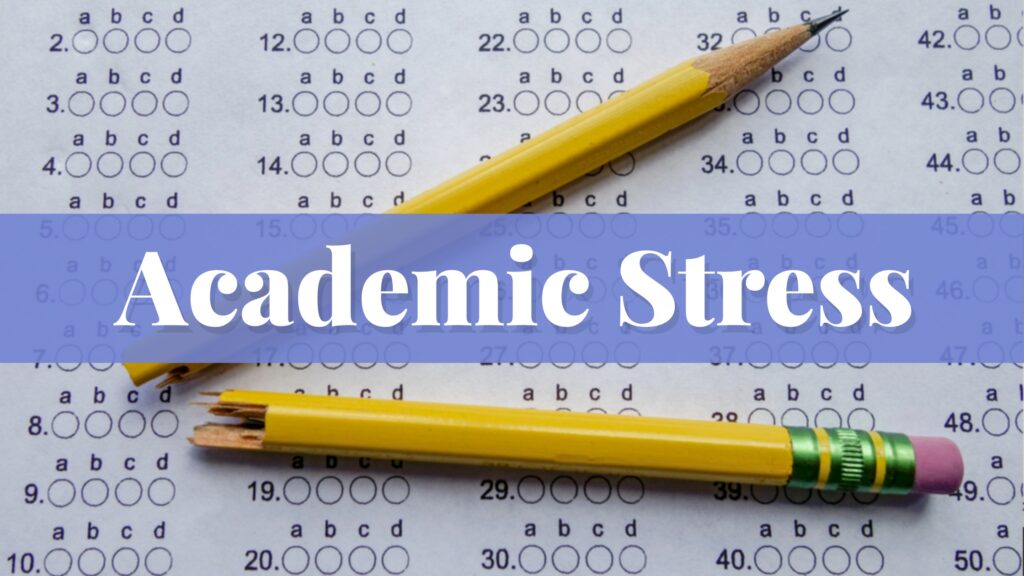When stress gets the best of students: Academic Stress

In this era of increasing competition, the level of pressure has been increasing and academic stress is becoming a huge problem for children. Whether kids are learning from home or are in the classroom, the effect of academic stress continues, it has become part of the students’ academic life because of the numerous expectations that are placed upon their shoulders and the key reason behind this is parental pressure and school or college-related stress.
Academic stress is mental discomfort about some expected frustration related to academic failure or not knowing the possibility of such downfall. Academic stress is a common problem among students, particularly in high school. Let us look at how this is caused: upcoming tests, heavy workload, lack of organisation, poor time management, poor sleep schedule, disinterest in subject/ attending classes, having to perform/ present in class, lack of understanding or support, changes in the environment, changes in daily routine, difficult/advanced classes, loneliness, homesickness, inability to balance work and study, worrying about revising for exams, feeling unsure about what to do after graduation, substance abuse or too much homework/ assignments/ projects.
Occasionally, stress is good. It encourages us to do our work and fulfil the deadlines. But when this stress increases and results in decreased productivity, anxiety or starts interfering with our lifestyle it is then time to take action.
The impact of academic stress on mental health is a well-researched subject, research reveals that when we feel overwhelming stress about school/ college it not only demotivates us to finish the work, it also decreases our academic performance and can lead to increased dropout ratios. Some major negative impacts include depression, inadequate sleep, nervousness, stress-related disorders, substance abuse, and anxiety.
A recent survey has indicated that academic stress is disturbing children at a very young age. A student of Class VIII from a reputed school committed suicide after she was unable to cope up with the academic pressure. Anxiety is seen as a disorder in about 8% of children and adolescents throughout the world. Stress and anxiety have a massive negative effect on the social, emotional and academic success of an individual.
Academic pressure is one of the major factors causing not just stress but depression in children. Depression is evolving as the most common mental health issue students go through these days. It is the contemplation of an individual’s academic frustration, fights, competition, anxiety and pressure. These branches of academic stress are generally identifiable in a student and can lead to serious repercussions in the future hence, the best way to face this is to equip the children for this situation. This not only provides a sense of control over the situation but also gives you a better understanding of the kind of pressure you might experience.
Cracking how to control your stress begins with the ability to identify it. Here are some indicators of academic stress:
- Change in academic performance
- Forgetfulness
- Unwanted/ repetitive thoughts
- Difficulty in concentrating
- Missed assignments/ Not prepared for class
- Lack of organisation
- Unexcused/ Increased leaves or absences
- Sleeping in classes
- Lesser engagement in classes
- Avoiding social interaction before/ during/ after classes
- Feeling overwhelmed and hopeless
- Doesn’t respond to teachers/ processors
- Talks about dropping classes/ majors
Once you’ve recognised your academic stress, or if you are the parent or friend of a student who is depicting symptoms of academic stress, then a few ways to deal with academic stress include:
- Manage your time: If you have a clear idea of your schedule, you will feel more in control, allowing you to complete your tasks peacefully and confidently.
- Organise the work: Making a to-do list makes work much more manageable by helping prioritise and create an exact structure of what must be done. Once you know what you have to do, you won’t be pressurised by your assignments.
- Take breaks: Whenever you find yourself stressed, put your pens and pencils down and take a break, breathe. Things like these are very necessary to recharge.
- Ask for help: When you come across an apparently impossible problem, message a friend or a teacher for help and then switch to other assignments. Don’t spend hours focusing on this problem if you are unable to complete it, time will slow you down.
- Reward yourself: Set up a system of rewards so that you have something to look forward to after completing a group of tasks. For example, give yourself a bar of chocolate once you complete solving a sample paper.
- Take a healthy diet: Foods with high fat and sugar content can make you feel lazy and unmotivated to complete your tasks hence, eating the right food will boost your energy and give you the stamina you need to work.
- Exercise: Not only does exercising improve your health and helps in better sleep but it also boosts endorphins resulting in more happiness and making you less anxious.
- Adequate and restful sleep: It is impossible for you to be able to focus or give your best at work without a good night’s sleep.
- Mark recharge days on your calendar: Set time to spend the weekends with friends or family. Do not focus on work or school during these times, because you will work more efficiently and effectively with breaks to rest and socialize to prevent burning yourself out.
- Take accountability for your mistakes: When you make a mistake, take responsibility for it, apologise and be more prepared next time.
- Live in the present: The past is left behind and the future is yet to come, therefore you should focus on the present and work on things that you have control on.
Children are one of the most vulnerable lots when it comes to stress and pressure and that’s because it’s pretty hard for them to cope with the situation or manage their stress.
With the growing academic pressure on children as well as the pressure from parents, dealing with stress and pressure becomes that much more difficult. That is why it is very important to know how much stress is too much stress and how to cope up with it, for a happy and prosperous lifestyle!
References:
Academic Stress: Coping Strategies. (2020, July 19). Psychological & Counseling Services. https://www.unh.edu/pacs/academic-stress-coping-strategies
The Jed Foundation. (2021, July 29). Student Stress 101: Understanding Academic Stress | JED. https://jedfoundation.org/resource/understanding-academic-stress/













I am really inspired with your writing talents and also with the layout in your weblog. Is this a paid subject matter or did you customize it yourself? Either way stay up the nice high quality writing, it is uncommon to look a nice blog like this one nowadays!